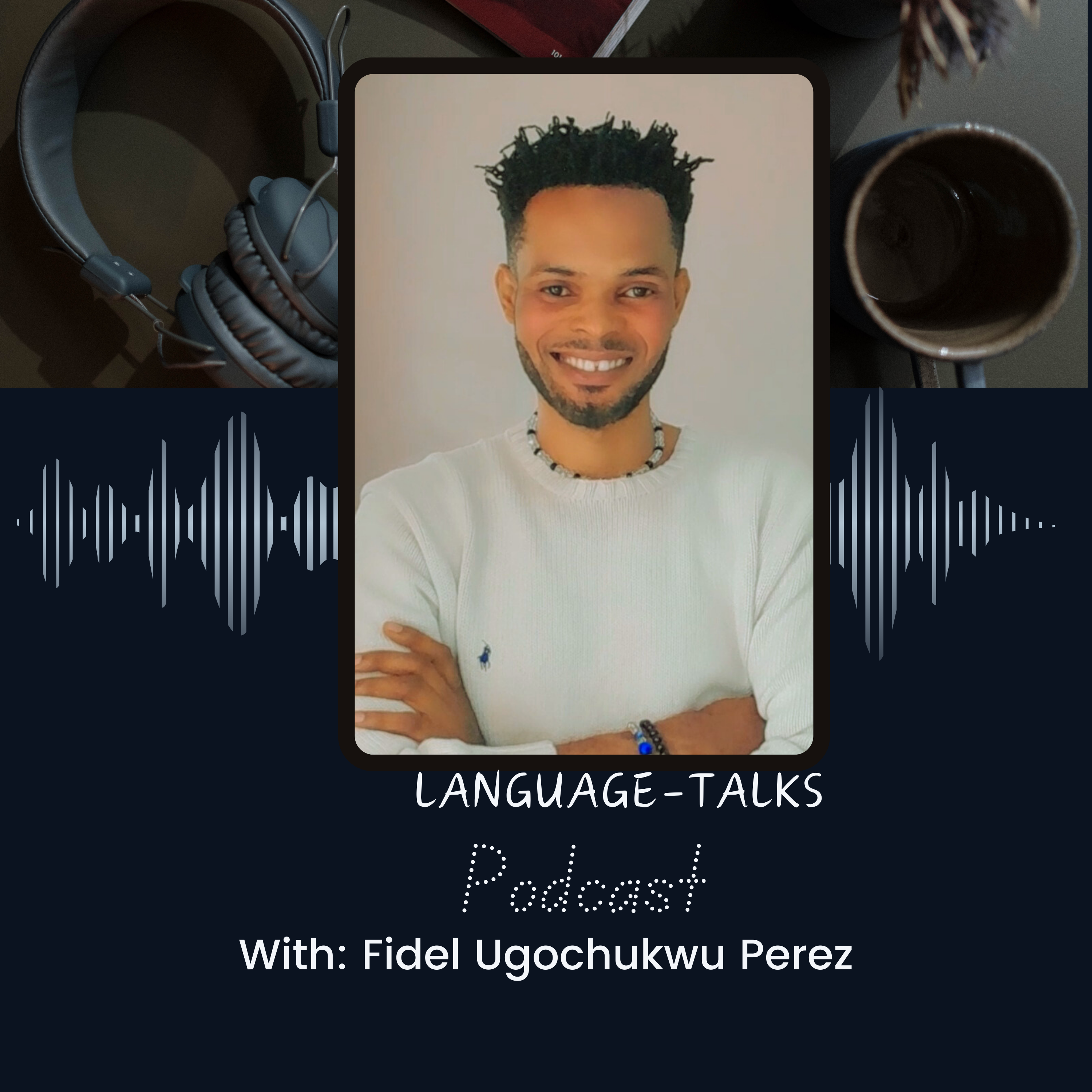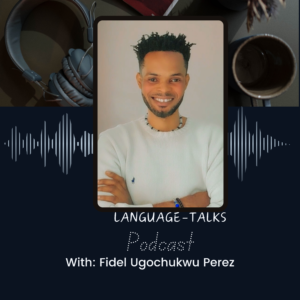Spanish Beginner Podcast Episode 2

Fidel Ugochukwu Perez
SPANISH BEGINNER PODCAST EPISODE 2
Fidel Ugochukwu Perez: Welcome, welcome, dear listeners, to another enlightening episode of Language Talks Podcast! I’m your host, Fidel Ugochukwu Perez, and I’m thrilled to embark on this journey of language exploration with you.
Whether you’re tuning in for the first time or you’ve been a dedicated listener from the start, I extend a warm welcome to each and every one of you. Language Talks is not just a podcast; it’s a community—a space where we delve into the tones of language and communication, and where we strive to enhance our linguistic dexterity together.
For more info, simply head over to Spotify and navigate to the show notes, or visit our website at www.gistandmore.com/podcasts. There, you’ll find a treasure trove of resources to complement your learning journey.
In today’s episode, I’ll be diving into numerals, days of the week, and names of the months in Spanish. Plus, we’ll practice some simple sentences. Let’s get started!”
Segment 1: Numerals in Spanish
Host: “Let’s begin with numerals. First, we’ll cover the numbers from 1 to 20.”
Host: “Listen and repeat after me:
- Uno
- Dos
- Tres
- Cuatro
- Cinco
- Seis
- Siete
- Ocho
- Nueve
- Diez
- Once
- Doce
- Trece
- Catorce
- Quince
- Dieciséis
- Diecisiete
- Dieciocho
- Diecinueve
- Veinte
Great! Now let’s move on to the tens from 30 to 100.”
“Listen and repeat:
30. Treinta
40. Cuarenta
50. Cincuenta
60. Sesenta
70. Setenta
80. Ochenta
90. Noventa
100. Cien
Notice the pattern? Once you learn the tens, it’s easier to construct numbers in between. For example, 31 is ‘treinta y uno,’ 42 is ‘cuarenta y dos,’ and so on.”
Segment 2: Days of the Week
Host: “Now, let’s learn the days of the week. Listen and repeat after me:
- Monday: Lunes
- Tuesday: Martes
- Wednesday: Miércoles
- Thursday: Jueves
- Friday: Viernes
- Saturday: Sábado
- Sunday: Domingo
Let’s use these in a sentence. In Spanish, ‘Today is Monday’ is ‘Hoy es lunes.'”
“Repeat after me: Hoy es lunes.”
Segment 3: Names of the Months
Host: “Next, we have the names of the months. Listen and repeat after me:
- January: Enero
- February: Febrero
- March: Marzo
- April: Abril
- May: Mayo
- June: Junio
- July: Julio
- August: Agosto
- September: Septiembre
- October: Octubre
- November: Noviembre
- December: Diciembre
To use a month in a sentence: ‘My birthday is in July’ translates to ‘Mi cumpleaños es en julio.'”
“Repeat after me: Mi cumpleaños es en julio.”
Segment 4: Simple Sentences
Host: “Let’s practice some simple sentences to help you get comfortable with these new words. I’ll say the sentence in English, then in Spanish. Repeat after me.
I have two brothers.
o Tengo dos hermanos.
She is twenty years old.
o Ella tiene veinte años.
We go to school on Monday.
o Vamos a la escuela el lunes.
The meeting is in March.
o La reunión es en marzo.
She will arrive at six.
o Élla llegará a las seis.
Now, I’ll be introducing a charming story that will help you practice the Spanish numerals, days of the week, and months of the year that we learned earlier.
This story is about a girl named Elena, who finds love while helping her grandmother with house chores and running errands. As you listen, pay attention to how the numbers, days, and months are used in context. Let’s dive into the story of Elena.”
Hay una chica llamada Elena que vive en un pequeño pueblo.
There is a girl named Elena who lives in a small town.
Todos los lunes, miércoles y viernes, Elena ayuda a su abuela con los quehaceres de la casa.
Every Monday, Wednesday, and Friday, Elena helps her grandmother with household chores.
En enero, Elena decide plantar veinte flores en el jardín de su abuela para alegrar el invierno.
In January, Elena decides to plant twenty flowers in her grandmother’s garden to brighten the winter.
Cada mañana, Elena cuenta las flores mientras las riega: “Uno, dos, tres… hasta veinte.”
Every morning, Elena counts the flowers while watering them: “One, two, three… up to twenty.”
Su abuela siempre está agradecida por la ayuda y el cariño de Elena.
Her grandmother is always grateful for Elena’s help and affection.
Elena es muy querida por todos en el pueblo.
Elena is very loved by everyone in the town.
En abril, organiza una fiesta para celebrar el cumpleaños de su abuela, que cumple setenta años.
In April, she organizes a party to celebrate her grandmother’s seventieth birthday.
Invita a todos los vecinos y prepara una deliciosa tarta.
She invites all the neighbors and prepares a delicious cake.
Los sábados, Elena va al mercado a comprar los ingredientes: tres kilos de harina, dos kilos de azúcar y diez huevos.
On Saturdays, Elena goes to the market to buy the ingredients: three kilos of flour, two kilos of sugar, and ten eggs.
Todos dicen que Elena es una chica prometedora y amigable.
Everyone says that Elena is a promising and friendly girl.
Gracias a su dedicación y amabilidad, Elena hace de cada día un día especial para su abuela y para todos los que la conocen.
Thanks to her dedication and kindness, Elena makes every day special for her grandmother and for everyone who knows her.
In this lesson, we’ll focus on 2 key Spanish verbs from the story about Elena. We’ll cover their meanings, conjugations in the present tense, and use them in sentences.
- Vivir (to live)
Conjugation in Present Tense:
- Yo vivo
I live
- Tú vives
You live (informal singular)
- Él/Ella/Usted vive
He/She lives, You live (formal singular)
- Nosotros/Nosotras vivimos
We live
- Vosotros/Vosotras vivís
You all live (informal plural, mainly used in Spain)
- Ellos/Ellas/Ustedes viven
They live, You all live (formal plural)
Example Sentences:
- Elena vive en un pequeño pueblo.
Elena lives in a small town.
- Nosotros vivimos en una casa grande.
We live in a big house.
- Ayudar (to help)
Conjugation in Present Tense:
- Yo ayudo
I help
- Tú ayudas
You help (informal singular)
- Él/Ella/Usted ayuda
He/She helps, You help (formal singular)
- Nosotros/Nosotras ayudamos
We help
- Vosotros/Vosotras ayudáis
You all help (informal plural, mainly used in Spain)
- Ellos/Ellas/Ustedes ayudan
They help, You all help (formal plural)
Example Sentences:
- Elena ayuda a su abuela con los quehaceres de la casa.
Elena helps her grandmother with household chores.
- Ellos ayudan a los vecinos.
They help the neighbors.
By practicing these verbs and their conjugations, you’ll become more comfortable using them in everyday conversations.
Join us next time as we continue our exploration of the Spanish language and dive deeper into its rich tapestry of words and expressions. ¡Nos vemos pronto! (See you soon!)
SEE OTHER EPISODES: Basic Spanish on Language Talks Podcast
LISTEN ON SPOTIFY: https://podcasters.spotify.com/pod/show/fidel-perez65/episodes/Basic-Spanish-Episode-2-e2l3o47
















